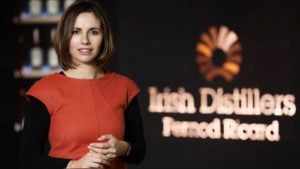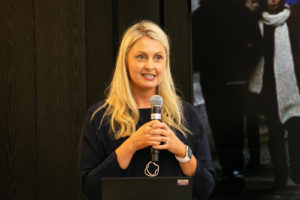Covid-19 React/Reality/Recovery: A Marketing Society Webinar

On 16th April the Marketing Society hosted their first ever event to discuss The Brand Impact of Covid-19 – React/Reality/Recovery.
It seemed fitting that during the year of their 50th anniversary they took a new step in educating the marketing industry in the new times we find ourselves.
The speakers for the day included Cliona Hayes, Director of Global SMB Marketing & Communications at Indeed, Rosemarie Garth, Directors Communications and Corporate Affairs at Irish Distillers, Geraldine O’Leary, Group Head of Commercial at RTÉ, Andy Pierce, Strategy Director at Core, and Richard Colwell, CEO at RedC Research.
Richard Colwell
 Richard Colwell began by explaining how his company is looking at this crisis. They are dividing it into two phases. The first of which he described as “Shock and Awe”, this began on the 13th March with Leo Varadkar’s announcement. The initial reaction was fear, for our jobs, our health, our finances and our mental health. There was a readjustment as we many moved to work from home and we all started being more socially distant. There was recognition of the scope of the challenge that faced the world, not just medically but economically.
Richard Colwell began by explaining how his company is looking at this crisis. They are dividing it into two phases. The first of which he described as “Shock and Awe”, this began on the 13th March with Leo Varadkar’s announcement. The initial reaction was fear, for our jobs, our health, our finances and our mental health. There was a readjustment as we many moved to work from home and we all started being more socially distant. There was recognition of the scope of the challenge that faced the world, not just medically but economically.
As well as this there was a yearning, for our friends, social interaction and our freedom. Research by RedC showed that there were other effects such as sleeping difficulties, eating became social focus, shopping changed (panic buying), increase in screen time, financial changes (things considered essential were now reconsidered) and there were a greater focus on family Relationships
The second phase as he described it was “Steadying the Ship”. The initial fears were supplanted by fears that this is here for long term and a fear for other people, such as vulnerable relatives. As we adapted we began spending time on home and life improvements, this could be seen through the sourdough phenomenon. There has been a re-prioritization in people’s minds to put people first and the idea that slow can be good. There continues to be a thirst for media – this was initially driven by news, in the second phase there is now a greater desire for escapism.
Andy Pierce
 Andy Pierce from Core elaborated on the weekly media monitor that Core Research have been carrying out since the crisis began. They have seen increases across every media channel (except outdoor). He echoed Richard’s point about escapism and they are now seeing a switch off from news and current affairs.
Andy Pierce from Core elaborated on the weekly media monitor that Core Research have been carrying out since the crisis began. They have seen increases across every media channel (except outdoor). He echoed Richard’s point about escapism and they are now seeing a switch off from news and current affairs.
Despite being initially hesitant to say it, given how sensitive a topic Covid-19 is, they are now talking about opportunities for brands (such as getting away big campaigns in short space of time).
Core are looking at this in three phases. The first of which is Adaption, where they ask are messages still suitable. They see pulling back in many instances with brands cutting or deferring spends. The second phase is Reaction, here they ask what’s the objective, what’s the opportunity to grow brand equity, is there still a demand for product, who can you help, who should you help and who’s asking for help? The third phase, and what we’re moving into now, is Recovery (or recession into recovery). Here they are asking where does the brand want to be at the end of this year and next year, what is the economy going to look like and how will it affect your business?
Andy stated, and Core are starting to tell their clients, that we all need to start scenario planning for phase three now. There’s an opportunity to use phase two as a springboard for phase three.
Rosemary Garth
 Rosemary Garth is part of a company that has been praised for their reaction to the crisis. She stated that when crisis hit they had to come to terms with what it meant to them as business. Irish distillers wanted to play their part in this but had to ask, help how? It is not new for Irish distillers they work in community all the time.
Rosemary Garth is part of a company that has been praised for their reaction to the crisis. She stated that when crisis hit they had to come to terms with what it meant to them as business. Irish distillers wanted to play their part in this but had to ask, help how? It is not new for Irish distillers they work in community all the time.
As one of the biggest producers of alcohol it made sense for them help tackle the hand sanitiser shortage, where one of the key ingredients is alcohol.
They worked with a team of scientists in Cork to change their manufacturing process and are now producing 120k units for HSE every week. This was not done in a CSR way, the first goal was not to engender positive news around the brand, there was a genuine desire to get involved.
Rosemary said that she had great admiration for the other companies that moved early to get involved such as An Post and O’Neill’s. However the most impactful work has come from communities.
From a brand perspective it’s not about what it’s about how. She said communications is important, the main thing is not to be self-congratulatory as the public will recognise that instantly.
Cliona Hayes

Cliona Hayes told the audience that Indeed has spent weeks trying to figure out role in crisis and how to act authentically. They asked, how can they be relevant and useful. Indeed's purpose is to get people jobs so they have data on jobs that they have been sending to governments to help soften the economic impact.
She expressed a similar sentiment to Andy about initial reaction, they had to set up task forces to audit campaigns and see if they were still fit for purpose. Things were done incredibly quickly, humour campaigns were cut for SMEs as they did not fit the tone of the moment.
They worked hard to create something empathetic and responsible, finding out where each market was in crisis and communication was key. They pulled campaigns won’t be fit for purpose post-Covid and are now re-planning messaging for after crisis.
Their main focus centrally is how do they support local teams in all markets? They, of course, have brand guidelines around tones, but they recognise local is so important.
The initial phase was reaction, now they need to think about rebuild. Big part of what they’re doing is social listening to find out what customers are thinking.
Peter then brought up the double-edged sword for media-owners. That Media consumption is up but advertising spend is down.
Geraldine O'Leary
 Geraldine O’Leary spoke on this by saying there are two sides to every story. For RTÉ the editorial is phenomenal, they have proven the need for Public Service Broadcasting. Highlighting the work of RTÉ journalists she stated she was proud to work in a company providing a vital service at this time of crisis.
Geraldine O’Leary spoke on this by saying there are two sides to every story. For RTÉ the editorial is phenomenal, they have proven the need for Public Service Broadcasting. Highlighting the work of RTÉ journalists she stated she was proud to work in a company providing a vital service at this time of crisis.
Ironically, revenue is going opposite direction. In the last few weeks RTÉ has been nimble, they have made changes to programming such a Home School Hub and Operation Transformation: Keeping Well Apart. Through the RTÉ 2FM #createdontcontaminate campaign and the live stream concerts with artists they have raised awareness of what needs to be done as well as money for charities doing vital work now.
She said that we need to be careful as industry not to talk things down. Some of the numbers she has been seeing don’t reflect RTÉ. Radio hit budget for April, as a result of new advertisers coming on as well as some dropping off. Now, it may sound like Covid radio at times but they are important messages.
TV is down but not as much as UK. We’ve noticed that first and foremost, advertisers want to get to be right. Since the first week people have reacted well and changed messaging and tone of their campaigns. She points to the example of how Renault adapted the message on their sponsorship stings around The Late Late Show.
At this moment it might seem like planning for the future is impossible but RTÉ are doing their best. Some of the old rules are broken, previously we would have baulked at a three minute ad, now we’re asking advertisers to send them to us.
Without wishing to be Pollyanna she said it’s not as bad as they say, and things will improve.
Questions
Questions from the audience brought further insights. Fiona from Core Research asked about finding the balance between planning next steps and reacting quickly. Richard said that they are finding that for consumers is demand for normality outside of crisis. They want brands to carry on and don’t want to think this is a long-term situation. So while it may seem counter-intuitive, you can be nimble by carrying on. His research is backed up by research carried out by Kantar which showed that only 8% of people believe that companies should stop advertising, 64% saying it’s ok to advertise and 19% believing that it’s appropriate to advertise. [Source] In the same study we find that content doesn’t need to specifically reference coronavirus as people are all too aware of the situation and people don’t seem to be sensitive to seeing scenes that show banned or restrictive behaviours.
Cliona highlighted that all brands are saying the same thing now. As we move on, brand messages will become different, people will laugh again but brands need to get the tone right. At Indeed they’re finding balance with 20% of their time going towards reaction and 80% towards planning. They’re expecting next stage to come fast.
The next question was what are clients demanding of agencies right now? Rosemarie spoke first on this. For them it’s about being true to brand values. Consumers still want to hear from them so they keep tone of voice and adjust messaging slightly. They want their agency to maintain brand values that Jameson stands for. For example, they’ve donated 500k to bartender’s guild in US, this builds on what they’ve done in the past, it is not doing something totally new and inauthentic.
Another question came for people looking to see what the impact will be on the types of jobs that will be needed, and what type of skills will be in demand following the crisis. Working in a recruitment company, Cliona was well-placed to answer this. She said that Indeed are putting big budgets into SEO, TV and Radio. She highlighted that TV is expensive and most advertisers won’t have same budgets as before so budgets may move from TV.
The skills she sees as being important are social listening and general agility and ability to adapt as we’ll see plenty of change over the next number of years. She believes that partners in agencies will be more important than ever. A lot of skills will be the same but with added flexibility. For creative there will be less shoots and a greater reliance on graphics.
Andy Pierce commented that they are seeing a trend toward online shopping. This will have a couple of knock on effects. Some local businesses have done well by being prepared, this is the type of thing that affects smaller businesses more, as consumers were used to dealing with larger companies online. He referenced SARS which caused Alibaba to take huge steps forward in terms of adoption.
There’s a thought that this will change things forever, Andy said that he doesn’t subscribe totally to this idea but thinks online retail is one of the areas where there will be an acceleration of the pre-existing evolution.
The impact on so-called “traditional channels” (TV/Radio/Print) has been a decrease in spending in the short-term but it is unclear what the long-term impact will be. We’ve also seen the first ever MoM drop in investment to Facebook and Google. He warned that it was possible to read too much into this had to happen at some point.
The question arose about brand investment. We’ve seen in the past, during downturns, that brands focus more on performance marketing rather than building long-term brand equity. This is despite the research showing the efficacy of long-term brand building.
Geraldine O’Leary pointed out that it was a false choice to think of either the short-term or the future as we, as marketers have to contend with both, all the time. She said that, in her experience, conversations are beginning to change. She stressed that if you go dark it will be harder to build brand equity back to where it was and we must keep investing. You need to keep your brand alive, going dark for a long time will cause huge problems.
Geraldine’s point is is backed up by research by Kantar. While it depends on sector the study showed using analytics and time-series data to simulate three different spend scenarios (stay the same; decrease by 50%; go dark) for a real beer brand, they that if it were to go totally dark it could lose about 13% of existing volume sales – market share that would be very hard to recover in the future. Similar results were shown for telco and automotive brands. The effects on brand equity and brand salience in the long-term could be even more disasterous for brands that go completely dark during the Covid-19 crisis.
Advice
The panellists were then asked to give one piece of advice each.
- Richard said consumers are crying out for normality and not to underestimate the power of giving them hope through continuing on. He understands that there are two problems brands are facing. Either they can’t meet demand because of panic buying and other factors, or they can’t sell because demand has dropped. A solution to both of these problems is to focus on long-term brand-building.
- Cliona followed up by saying that we know as marketers that it’s best to invest at this time but every business is different and to do what’s best for your business. The advice she gave was don’t be opportunistic, brands who do this will stand out for wrong reasons.
- Andy warned branded to beware the message gap. When we come out of this phase and into the next, we may not be able to dust off old message and put it to market. We need to start planning and design for the world we emerge into.
- Geraldine said that it’s not one size fits all. The only way marketer or brand can do what’s right for them is to talk to agencies and media owners. She sees a greater sense of cooperation in industry which is a positive that has come out of this crisis.
Summary

Peter McPartlin summarized the event with a few points. Firstly, we market to people not machines and this is first and foremost a humanitarian crisis, marketers needs to recognise that before thinking on their own messages. Small businesses need to be supported to keep doors open and workers need to be protected. We as an industry and a country need to support measures that help however we can.
It is becoming clear that we can’t rely on foreign direct investment as much as we have been, we need indigenous business and exports to grow. As marketers we need to convince brands and leaders that now is not the time for standing still and waiting to see what competitors do, now is the time for true leadership.
He closed by saying that there is a sense of solidarity at the moment, not just in communications but in how our behaviours are changing. This is our chance to define a new definition of normal, to focus on what makes our lives better, what makes our children happier, what gives us purpose. We society and the industry for the better and come through this crisis better than we entered it.